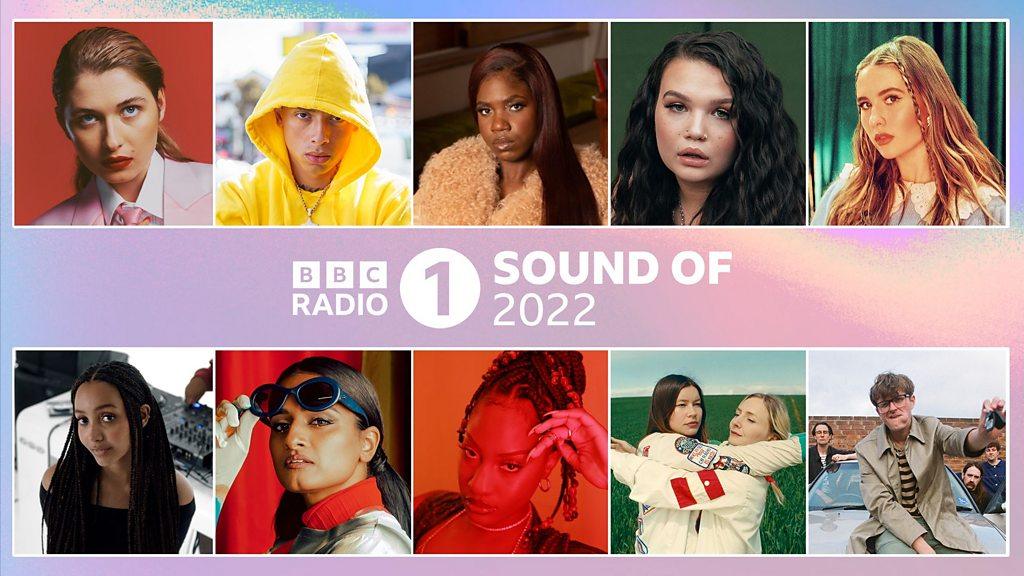Sound Of 2022: Lola Young's slow-burning anthems are bubbling over
- Published
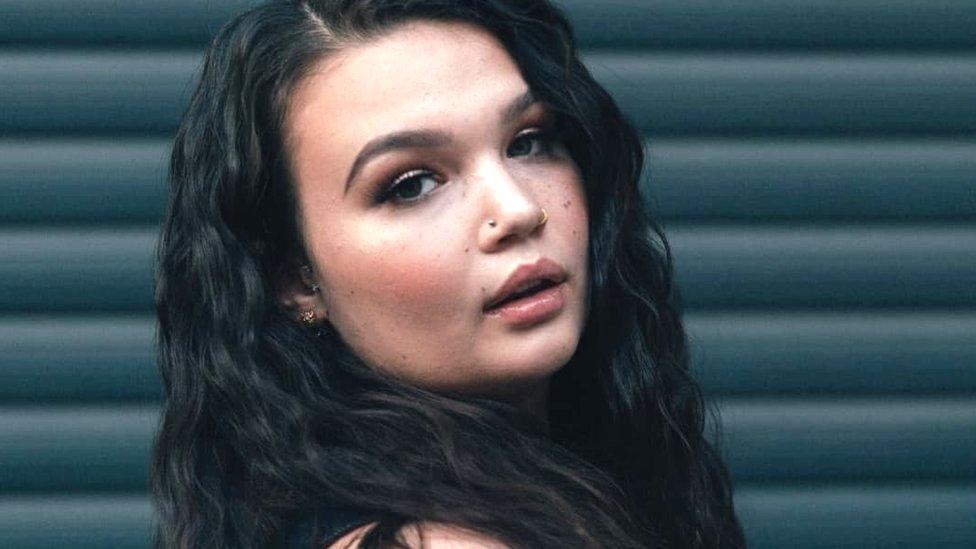
The singer-songwriter is managed by the team behind Adele and Amy Winehouse
"Are you joking? No way! Oh my God. That's amazing. Such good news."
Singer-songwriter Lola Young has just learned she's placed fourth in BBC Radio 1's Sound Of 2022 - which aims to predict the biggest new stars of the coming year.
She's in good company. In previous years, fourth place has gone to artists like Jorja Smith, Khalid, Sampha and Joy Crookes, who've all shaped the sounds of pop and soul in their own mould.
Young's deep, expressive vocals will be familiar to millions after she covered Together In Electric Dreams for this year's John Lewis Christmas Advert.
But the 21-year-old has been on the path to stardom since she wrote her first song, an ode to Santa Claus, when she was 11.
Before long, she'd won the Open Mic UK contest and booked a place at the Brit School, while playing as many gigs as she could around her native south London.
"I've done so many [awful] open mic pub gigs where I've rocked up and played to three old men drinking beer and talking through my performance," she says. "But I had to do that."
Allow YouTube content?
This article contains content provided by Google YouTube. We ask for your permission before anything is loaded, as they may be using cookies and other technologies. You may want to read Google’s cookie policy, external and privacy policy, external before accepting. To view this content choose ‘accept and continue’.
It was at one such showcase that she caught the attention of Amy Winehouse's ex-manager Nick Shymansky - who loved her husky, soulful sound, but was reluctant to take her on.
"He said he was too busy and too hurt from his past experiences," Young explains. So he introduced her to Nick Huggett, who discovered and signed Adele... before having second thoughts.
"Nick S decided that he couldn't miss out - so they ended up managing me together. They're like my uncles now!"
Signed to Island Records, Young released an assured debut album, Intro, at the age of 18. More recently, the attention-grabbing singles Fake and Bad Tattoo have seen her played on BBC Radio 1, and Elton John's Rocket Hour show.
She ended 2021 with a nomination for the Brits Critics' Choice award; and starts 2022 with the endorsement of the 130 pundits who voted for the BBC Sound Of list (the top three will be announced over the next three days).
"It feels like things are getting better and better," she beams. "The bubbling under the surface is starting to really, really bubble over!"
We caught up with her over Zoom to find out more about her backstory - and what she's got in store for the year ahead.
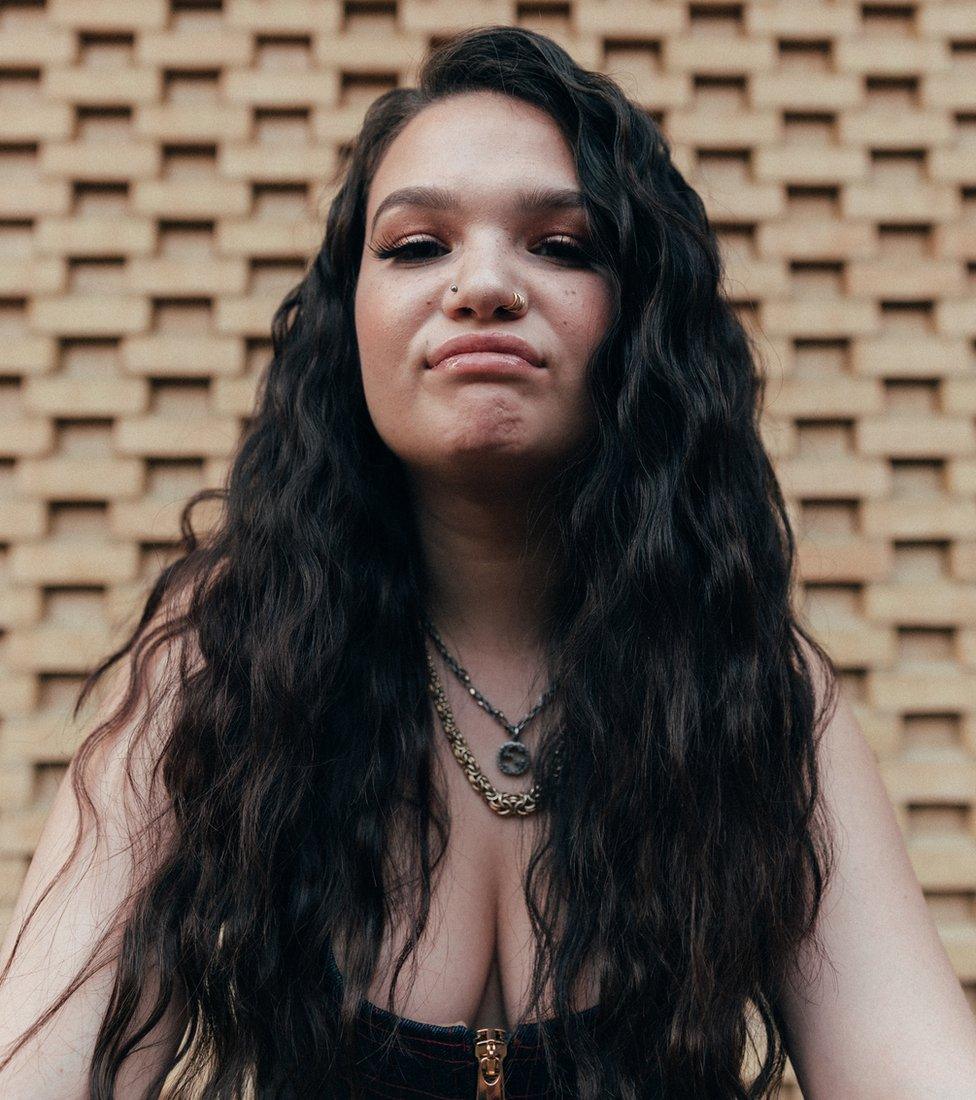

Have you always wanted to be a musician?
Yeah, I think for some people it comes a little bit later on, but I had it in my head that I wanted to be in music since I was maybe 10 or 11.
I've seen interviews where you said you weren't a natural singer. How much work did you have to do?
I think in other interviews, I've maybe been a little bit misunderstood in the sense that people thought I couldn't sing at all. It wasn't that. I had a voice, I was able to hold a note, but I didn't have the technical things like vibrato at all.
So, it was more the case that I had to work hard to get power and strength. Like with Beyoncé, I can imagine she just popped out singing to the heavens. I didn't have that.
I think she actually cried in perfect pitch when she was born.
Yeah, literally.
What did you enjoy singing when you were a kid?
The first album I remember putting on and really enjoying was Paolo Nutini's These Streets. Then, growing up, I listened to a lot of Eminem and Biggie and old school rap; and then eventually a lot of David Bowie, Prince. So my inspirations are quite different.
Do you remember the first time you recorded yourself singing?
Yeah, I was probably about 13, 14 and I went into a studio. Hearing my voice back was pretty mad - but it confirmed that's what I wanted to do.
Allow YouTube content?
This article contains content provided by Google YouTube. We ask for your permission before anything is loaded, as they may be using cookies and other technologies. You may want to read Google’s cookie policy, external and privacy policy, external before accepting. To view this content choose ‘accept and continue’.
You entered the Open Mic UK competition around the same time. What was that experience like?
Back when I was a kid, I thought X Factor or Britain's Got Talent was the way that people blew up. I didn't really understand the business side of things. So Open Mic UK was something I thought was going to change my life and, obviously, it helped a little bit - but it wasn't a game changer.
You won with an original song, right?
Yeah, it was called Never Enough and it's a song that's never gonna get released!
Has your writing changed since then?
A hell of a lot! I'm very careful about each lyric now. It can't just be a throwaway. And if it is, then we scrap it.
I guess when you start out, you're almost impersonating your favourite artists. Then as you grow and get more experience, you put more of yourself into the songs?
That's true - but I think people sometimes underestimate the real power that a young person has. I have one song that I wrote when I was 13, that I still really believe [in] and that's going to be on the album.
Is that I Learned From You?
Yeah, you know my music!
Why did that song survive when other ones got cast away?
It had quite an interesting concept. It was about a close relative and how I was trying to understand our relationship. It's kind of complex and, although I didn't really realise at the time, it's quite a mature song.
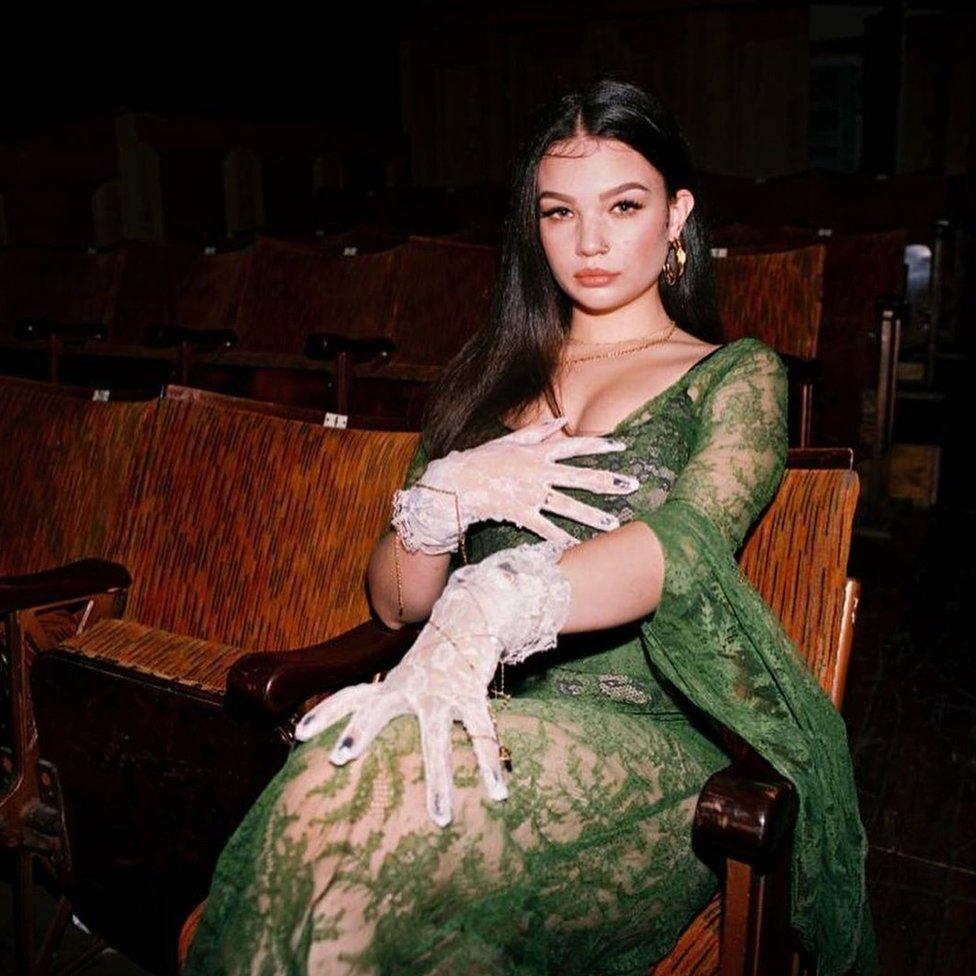
The singer's smoky, guitar-driven songs have seen her nominated for a Brit Award
You went to the Brit school after that. Was it what you expected?
Um, no, it wasn't. There's a tendency for people to assume the Brit school is the way to the top, but it's still a school. You still do lessons, you still meet bitchy people and there's still bullying. Even the headmaster would say, "We're not trying to create famous people. That's not why we're here."
I'm not saying I expected more than that because it was a really great experience. It helped me understand my style and where I wanted to go with my music.
You released your first album, Intro, when you were 18.
I was 18, yeah.
One of the tracks, Blind Love, is still your most played song on Spotify. Why do you think people love that song, in particular?
Just because it's a classic, sad love song. It's about the journey of a relationship and how it ends, but also trying to come to peace with that. I think a lot of people can relate to that feeling.
Allow YouTube content?
This article contains content provided by Google YouTube. We ask for your permission before anything is loaded, as they may be using cookies and other technologies. You may want to read Google’s cookie policy, external and privacy policy, external before accepting. To view this content choose ‘accept and continue’.
On Six Feet Under, you sing about being depressed and thinking about death. What's it like to share dark feelings like those in your music?
It's very complex suffering from mental health, I think. Especially as a person who has gone through life without really thinking about mental health - and then suddenly it hits you. You suddenly understand the stigma around it, because you start feeling ashamed about saying certain things, or feeling certain things. So I feel really strongly that I have to be super-honest in my lyrics. I'm sharing [those feelings] with the world but also, I'm trying to share it with myself, as well.
What do your friends and family think of those songs?
Sometimes it can be hard but my family and my friends are super-understanding. They know already what I've gone through. So as scary as it is to talk about the dark side of your mind, the importance of sharing, of honesty, overrides the fear.
The Intro album was just starting to make waves when you developed cysts on your vocal cords. Were you ever worried you'd lose your voice?
It was very frightening, for sure, especially because I had a new type of vocal surgery. But I had the best surgeon and it was fine. I mean, I'm still in recovery. My high register still cracks, so I might need to go for a check-up.
Just as you came out of hospital, the world went into lockdown. How did you find that?
For me. being indoors and being in my own space is quite hard. I hate it. I can't be alone. And I got Covid as well - not badly, but I did have Covid.
But it was a very tough year for a lot of people. People were very low and lost their jobs, you know? So my year was hard, but it wasn't the worst.
Allow YouTube content?
This article contains content provided by Google YouTube. We ask for your permission before anything is loaded, as they may be using cookies and other technologies. You may want to read Google’s cookie policy, external and privacy policy, external before accepting. To view this content choose ‘accept and continue’.
The other thing you did in 2020 was release Woman, which is one of your best songs. And it's quite political as well...
Woman was a process of me trying to understand how much one could be a feminist without being radical.
I think that people really don't understand what that word [feminist] means. I remember getting cat-called as a teenager going to school by an old man in a van and, as you grow up, you start to question why the world lets you believe this is normal. So in that song, I'm explaining what happens when you feel like you're less [important] than a man. It was something that I felt really strongly about.
The songs you've released subsequently, like Ruin My Make Up and Fake, have a similar sense of strength and defiance. I'm interested in why that's a theme that you've focused on lyrically in the last two years.
I don't really know why.... I think it's more that I wanted to change my sound up. I was listening a lot to The Cure, and using a lot of vintage sounds and baritone guitars. And I think when the sonic changed, the lyrics changed with it. Like Fake, for example, I think the drama goes well with the sound of the record.
It sounds like something off a Tarantino soundtrack.
Yeah, that was the intention!
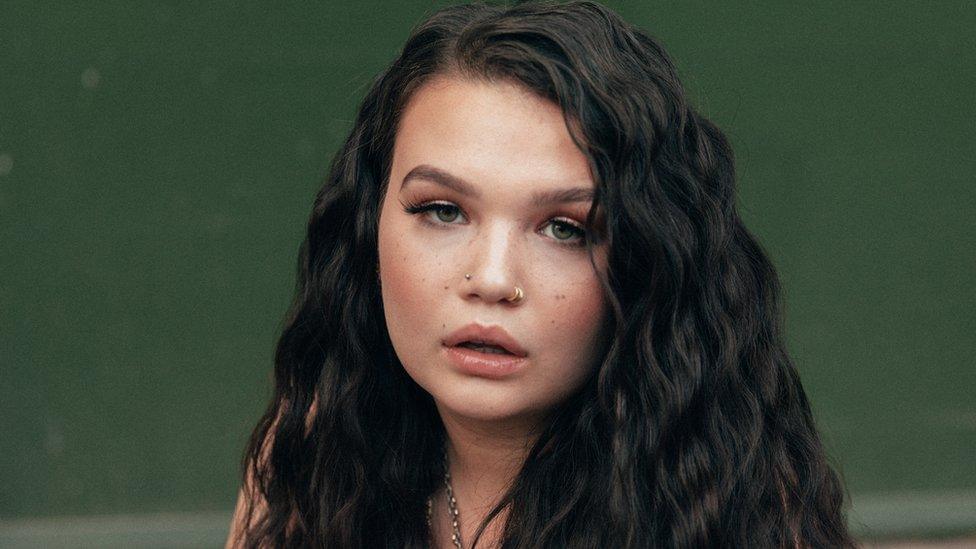
Young says her first song, an ode to Santa Claus, "wasn't great but it was the start of my development".
You ended 2021 by singing the John Lewis Christmas advert. I've always wondered how much input you get in that process? Like, do you get to choose the song?
The advertising company suggested the song. The only change I made was to sing it in a joyous way, with a tone of hope. That was a bit of a challenge, because the movement of the track is quite melancholic - but obviously it's supposed to be a Christmas song so it's not supposed to be too depressing!
Since then, I've started hearing your music more and more on the radio and in places like H&M. What's that like?
It's weird - but it's all I've ever wanted, so obviously that's really good.
And so, on to 2022. Are you working on a new album?
It's in the works! I've got a good few songs that I'm happy with but I don't know when exactly it will be released. Hopefully end of next year.
BBC Radio 1's Sound of 2022: Meet the nominees

Follow us on Facebook, external, or on Twitter @BBCNewsEnts, external. If you have a story suggestion email entertainment.news@bbc.co.uk, external.
Related topics
- Published2 January 2022
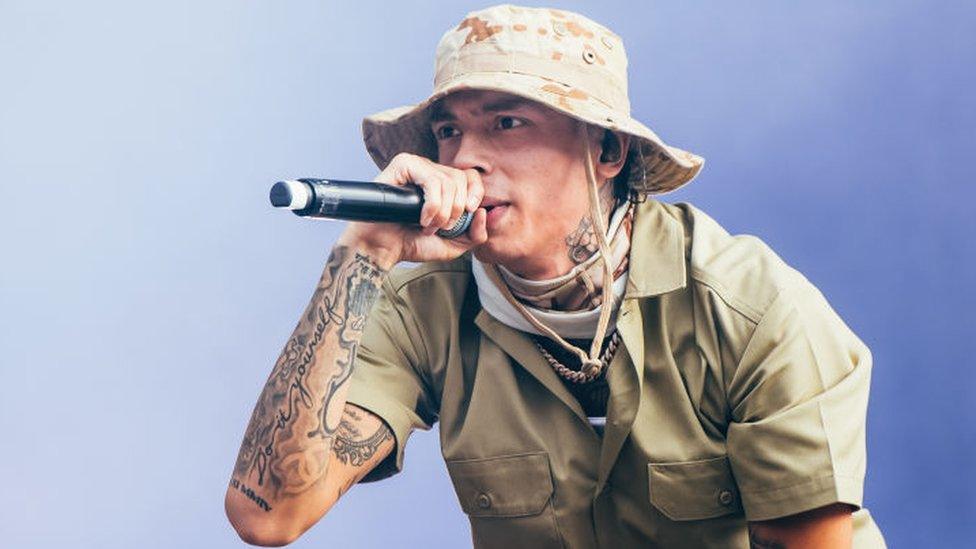
- Published6 December 2021
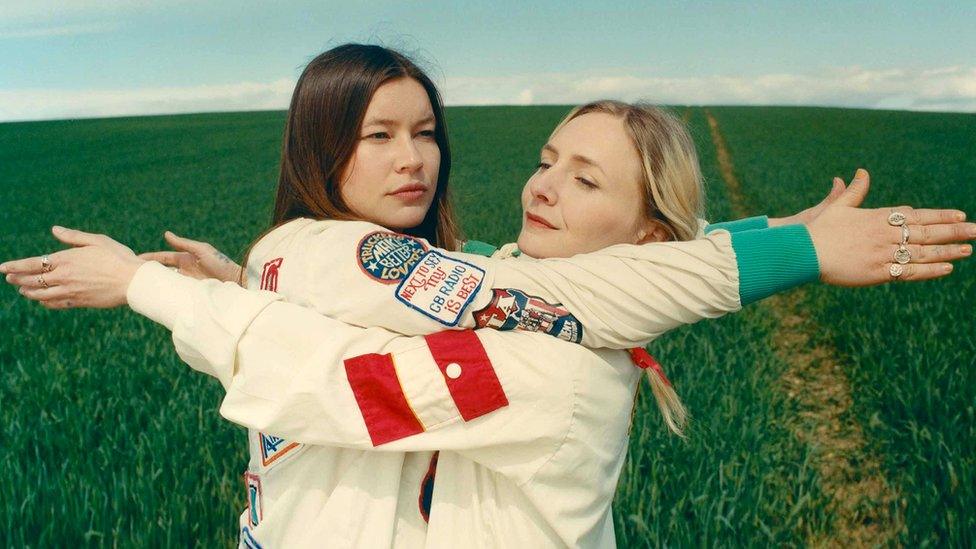
- Published6 January 2021
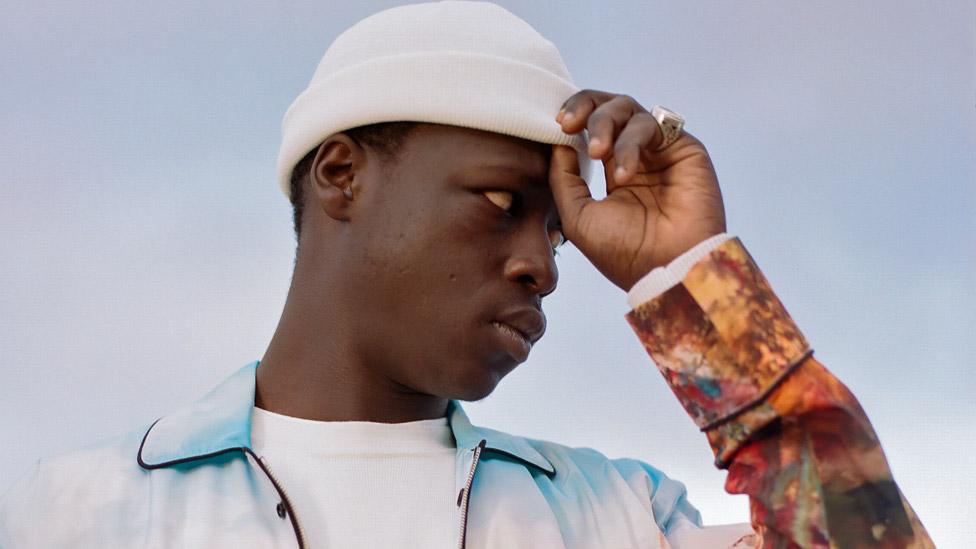
- Published5 January 2022
